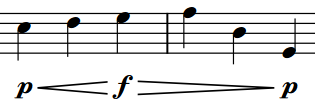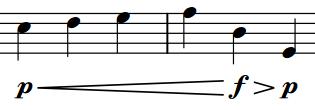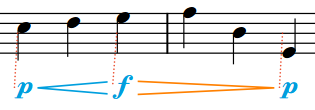Groups of dynamics
When dynamics are grouped together, they are automatically aligned in a row and can be moved and edited as a group. For example, you can move the in the middle of the example within the group, and the hairpins either side automatically adjust to compensate.
A single dynamic, either immediate or gradual, is considered a group on its own.
Two or more dynamics are automatically grouped together if they immediately follow each other horizontally on the staff, were input together or in sequence, and have gradual dynamics between the immediate dynamics.

Figure: A group of dynamics |

Figure: The same group of dynamics adjusts to compensate when the f moves position. |
All of the dynamics in a group are highlighted when any of the dynamics in the group are selected.

As well as horizontal groups of dynamics, you can also link groups of dynamics across staves if you want the same dynamics to appear on multiple staves. This can be useful when multiple instruments play the same dynamics simultaneously and you want to make the same change in all staves, for example, moving the peak of a crescendo to a later beat, or changing a to a .